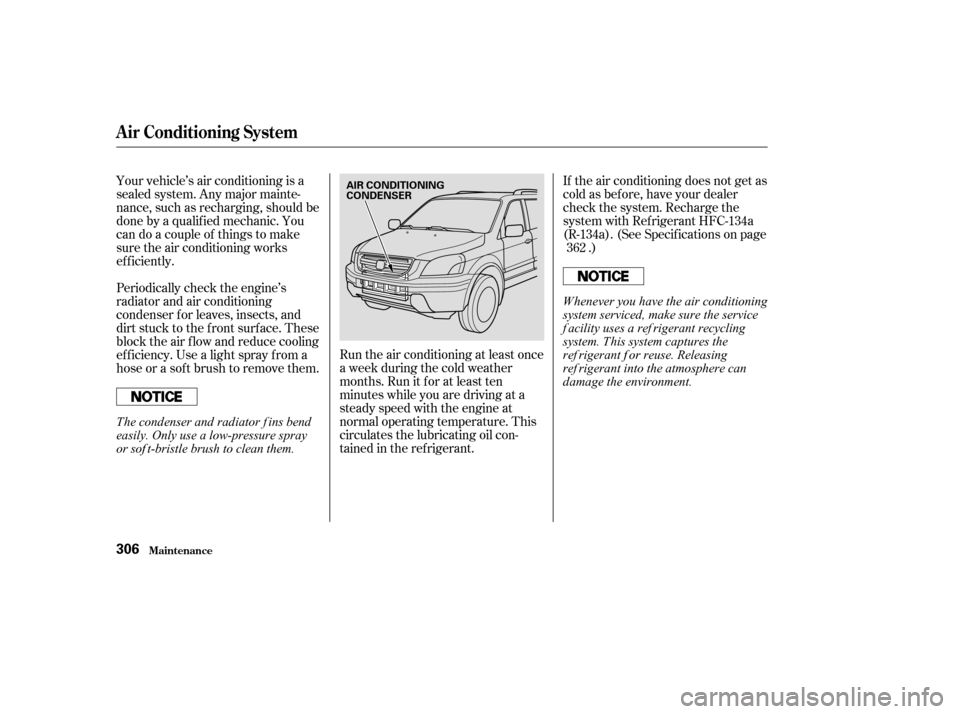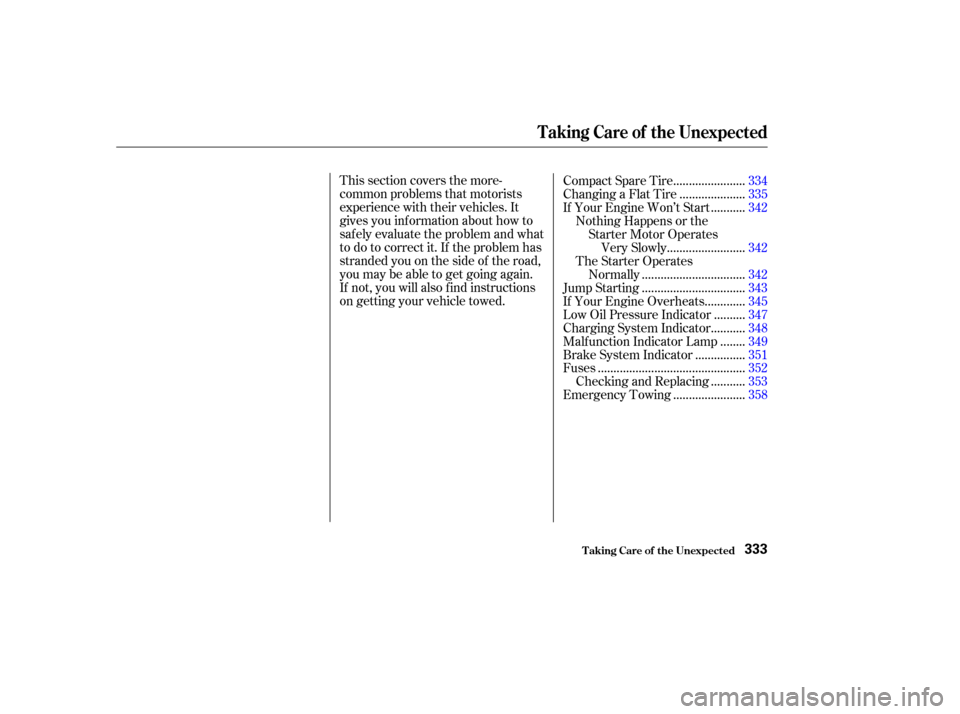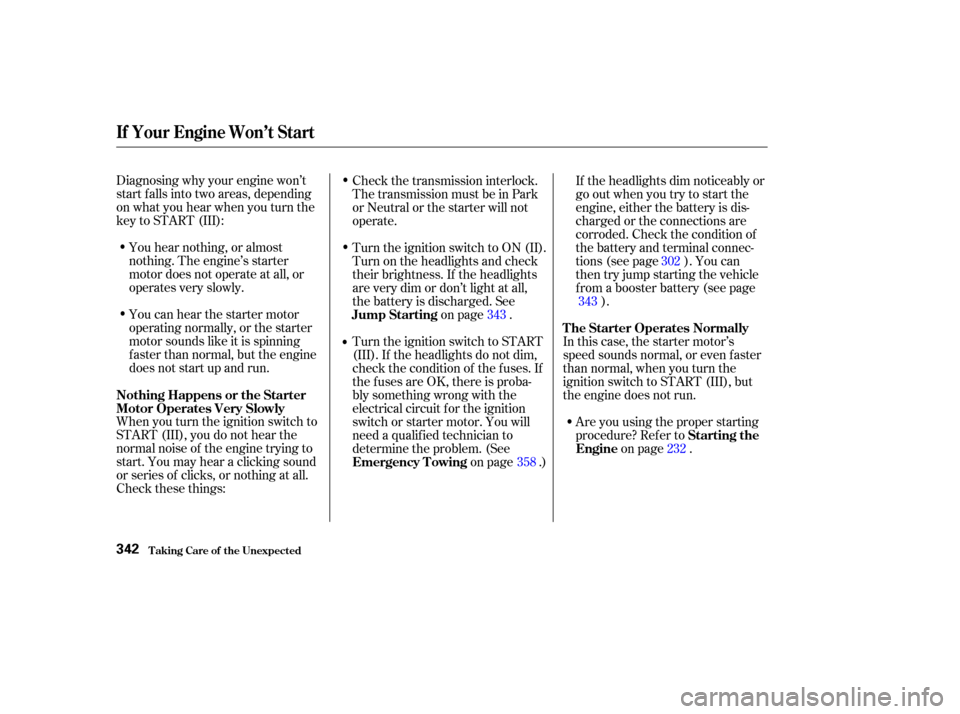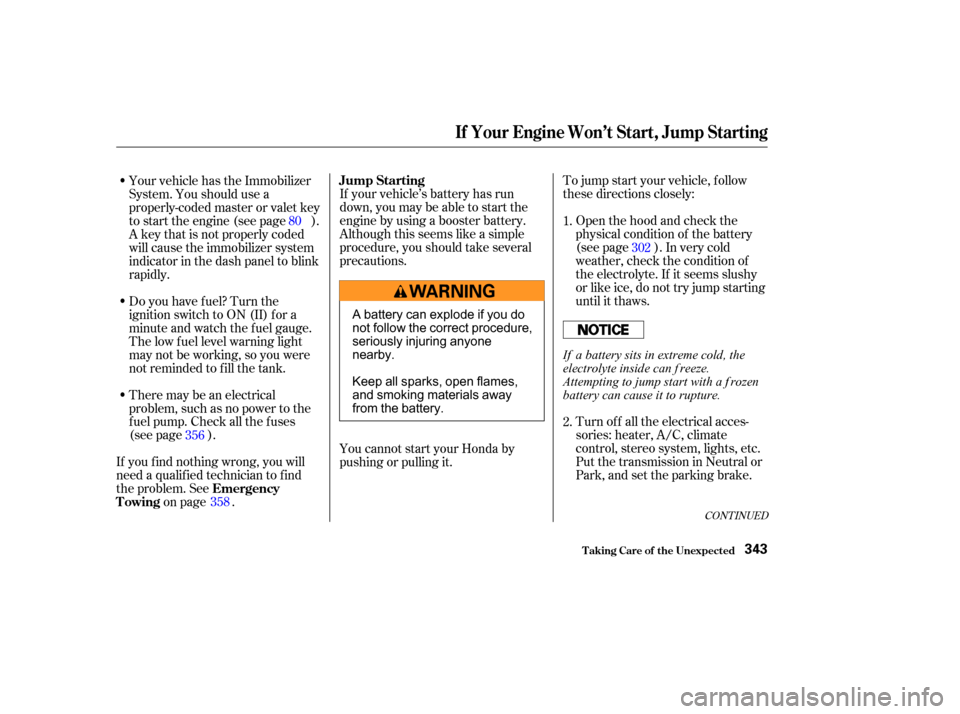Page 296 of 392
Fill the reservoir with a good-quality
windshield washer f luid. This
increases the cleaning capability and
prevents f reezing in cold weather.
When you ref ill the reservoir, clean
the edges of the windshield wiper
blades with windshield washer f luid
on a clean cloth. This will help to
condition the blade edges.
Check the level in the windshield
washer reservoir at least monthly
duringnormaluse.Inbadweather,
when you use the washers of ten,
check the level every time you stop
for fuel.
The low washer level indicator will
light when the level is low (see page
).
65
On Canadian models
Windshield Washers
Maint enance292
Do not use engine antif reeze or a
vinegar/water solution in the
windshield washer reservoir.
Antif reeze can damage your vehicle’s
paint, while a vinegar/water solution
can damage the windshield washer
pump.
Use only commercially-available
windshield washer f luid.
Page 297 of 392

Check the f luid level with the engine
at normal operating temperature.Park the vehicle on level ground.
Shut of f the engine.
Remove the dipstick (yellow loop)
f rom the transmission and wipe it
with a clean cloth.
Insert the dipstick all the way into
the transmission.
Remove the dipstick and check the f luid level. It should be
between the upper and lower
marks.
To thoroughly f lush the
transmission, the technician
should drain and ref ill it with
Honda ATF-Z1 (Automatic
Transmission Fluid), then drive
the vehicle a short distance. Do
this three times. Then drain and
ref ill the transmission a f inal time.
The transmission should be drained
and ref illed with new f luid according
to the time and distance recommen-
dations in the maintenance schedule. Insert the dipstick all the way back
in the transmission.
If the level is below the lower
mark, add f luid into the tube to
bring it to the upper mark. Always
use Honda ATF-Z1 (Automatic
Transmission Fluid). If it is not
available, you may use a
DEXRON
III automatic
transmission f luid as a temporary
replacement. However, continued use can affect shift quality. Have
the transmission f lushed and
ref illed with Honda ATF-Z1 as
soon as it is convenient.
If you are not sure how to add f luid,
contact your Honda dealer.
1.
2.
3.
5.
6.
4.
Maint enance
Automatic Transmission Fluid
293
DIPSTICK
DIPSTICK LOWER MARK
UPPER MARK
Page 300 of 392
Always use Honda Power Steering
Fluid. If it is not available, you may
use another power steering f luid as
an emergency replacement.
However, continued use can cause
increased wear and poor steering in
cold weather. Have the power
steering system f lushed and ref illed
with Honda PSF as soon as possible.
Check the level when the engine is
cold. Look at the side of the
reservoir. The f luid should be
between the UPPER LEVEL and
LOWER LEVEL. If it is below the
LOWER LEVEL, add power steering
f luid to the UPPER LEVEL. A low power steering f luid level can
indicate a leak in the system. Check
the f luid level f requently and have
the system inspected as soon as
possible.
Power Steering
Maint enance296
LOWER LEVELUPPER LEVEL
T urning the steering wheel to f ull lef t
or right lock and holding it there can
damage the power steering pump.
Page 310 of 392

Run the air conditioning at least once
a week during the cold weather
months. Run it f or at least ten
minutes while you are driving at a
steady speed with the engine at
normal operating temperature. This
circulates the lubricating oil con-
tained in the ref rigerant.If the air conditioning does not get as
cold as before, have your dealer
check the system. Recharge the
system with Ref rigerant HFC-134a
(R-134a). (See Specif ications on page
.)
Your vehicle’s air conditioning is a
sealed system. Any major mainte-
nance, such as recharging, should be
done by a qualif ied mechanic. You
can do a couple of things to make
sure the air conditioning works
ef f iciently.
Periodically check the engine’s
radiator and air conditioning
condenser f or leaves, insects, and
dirt stuck to the f ront surf ace. These
block the air f low and reduce cooling
ef f iciency. Use a light spray f rom a
hose or a sof t brush to remove them. 362
A ir Condit ioning Syst em
Maint enance306
AIR CONDITIONING
CONDENSER
Whenever you have the air conditioning
system serviced, make sure the service
f acility uses a ref rigerant recycling
system. This system captures the
ref rigerant f or reuse. Releasing
ref rigerant into the atmosphere can
damage the environment.
The condenser and radiator f ins bend
easily. Only use a low-pressure spray
or sof t-bristle brush to clean them.
Page 337 of 392

This section covers the more-
common problems that motorists
experience with their vehicles. It
gives you inf ormation about how to
safely evaluate the problem and what
to do to correct it. If the problem has
stranded you on the side of the road,
you may be able to get going again.
If not, you will also f ind instructions
on getting your vehicle towed.......................
Compact Spare Tire .334
....................
Changing a Flat Tire .335
..........
If Your Engine Won’t Start . 342
Nothing Happens or the Starter Motor Operates ........................
Very Slowly .342
The Starter Operates ................................
Normally .342
................................
Jump Starting .343
............
If Your Engine Overheats . 345
.........
Low Oil Pressure Indicator . 347
..........
Charging System Indicator . 348
.......
Malf unction Indicator Lamp . 349
...............
Brake System Indicator . 351
..............................................
Fuses .352
..........
Checking and Replacing . 353
......................
Emergency Towing .358
Taking Care of the Unexpected
T aking Care of t he Unexpect ed333
Page 346 of 392

Diagnosing why your engine won’t
start f alls into two areas, depending
on what you hear when you turn the
key to START (III):You hear nothing, or almost
nothing. The engine’s starter
motor does not operate at all, or
operates very slowly.
You can hear the starter motor
operating normally, or the starter
motor sounds like it is spinning
f aster than normal, but the engine
does not start up and run.
When you turn the ignition switch to
START (III), you do not hear the
normal noise of the engine trying to
start. You may hear a clicking sound
or series of clicks, or nothing at all.
Check these things: Check the transmission interlock.
The transmission must be in Park
orNeutralorthestarterwillnot
operate.
Turn the ignition switch to ON (II).
Turn on the headlights and check
their brightness. If the headlights
are very dim or don’t light at all,
the battery is discharged. See
on page .
Turn the ignition switch to START
(III). If the headlights do not dim,
check the condition of the f uses. If
thefusesareOK,thereisproba-
bly something wrong with the
electrical circuit for the ignition
switch or starter motor. You will
need a qualif ied technician to
determine the problem. (See on page .)If the headlights dim noticeably or
go out when you try to start the
engine, either the battery is dis-
charged or the connections are
corroded. Check the condition of
the battery and terminal connec-
tions (see page ). You can
then try jump starting the vehicle
f rom a booster battery (see page
).
In this case, the starter motor’s
speed sounds normal, or even f aster
than normal, when you turn the
ignition switch to START (III), but
the engine does not run. Are you using the proper starting
procedure? Ref er to on page .
343
358 302
343
232
Nothing Happens or the Starter
Motor Operates Very Slowly Jump Starting
Emergency T owingT he Starter Operates Normally
Starting the
Engine
T aking Care of t he Unexpect ed
If Your Engine Won’t Start
342
Page 347 of 392

To jump start your vehicle, f ollow
these directions closely:
If your vehicle’s battery has run
down,youmaybeabletostartthe
engine by using a booster battery.
Although this seems like a simple
procedure, you should take several
precautions.
Put the transmission in Neutral or
Park, and set the parking brake. Open the hood and check the
physical condition of the battery
(see page ). In very cold
weather, check the condition of
the electrolyte. If it seems slushy
or like ice, do not try jump starting
until it thaws.
Turn of f all the electrical acces-
sories: heater, A/C, climate
control, stereo system, lights, etc.
Your vehicle has the Immobilizer
System. You should use a
properly-coded master or valet key
to start the engine (see page ).
A key that is not properly coded
will cause the immobilizer system
indicator in the dash panel to blink
rapidly.
Do you have f uel? Turn the
ignition switch to ON (II) for a
minute and watch the f uel gauge.
The low f uel level warning light
may not be working, so you were
not reminded to f ill the tank.
There may be an electrical
problem, such as no power to the
f uel pump. Check all the f uses
(see page ).
If youfindnothingwrong,youwill
need a qualif ied technician to f ind
the problem. See on page . You cannot start your Honda by
pushing or pulling it. 1.
2.
80
356 358 302
CONT INUED
Jump Starting
Emergency
Towing
If Your Engine Won’t Start, Jump Starting
T aking Care of t he Unexpect ed343
A battery can explode if you do
not follow the correct procedure,
seriously injuring anyone
nearby.
Keep all sparks, open flames,
and smoking materials away
from the battery. If a battery sits in extreme cold, the
electrolyte inside can f reeze.
Attempting to jump start with a f rozen
battery can cause it to rupture.
Page 348 of 392
�µ
�´
�´
Start your vehicle. If the starter
motor still operates slowly, check
the jumper cable connections to
make sure they have good metal-
to-metal contact.
Once your vehicle is running,
disconnect the negative cable f rom
your vehicle, then f rom the
booster battery. Disconnect the
positive cable f rom your vehicle,
then the booster battery.
Connect the second jumper cable
to the negative ( ) terminal on
the booster battery. Connect the
other end to the grounding strap
as shown. Do not connect this
jumper cable to any other part of
the engine. The numbers in the illustration show
you the order to connect the jumper
cables.
If the booster battery is in another
vehicle, have an assistant start
that vehicle and run it at a fast idle.
Connect one jumper cable to the
positive ( ) terminal on your
Honda’s battery. Connect the
other end to the positive ( )
terminal on the booster battery. 5.
7.
3.
4.
6.
T aking Care of t he Unexpect ed
Jump Starting
344
BOOSTER BATTERY